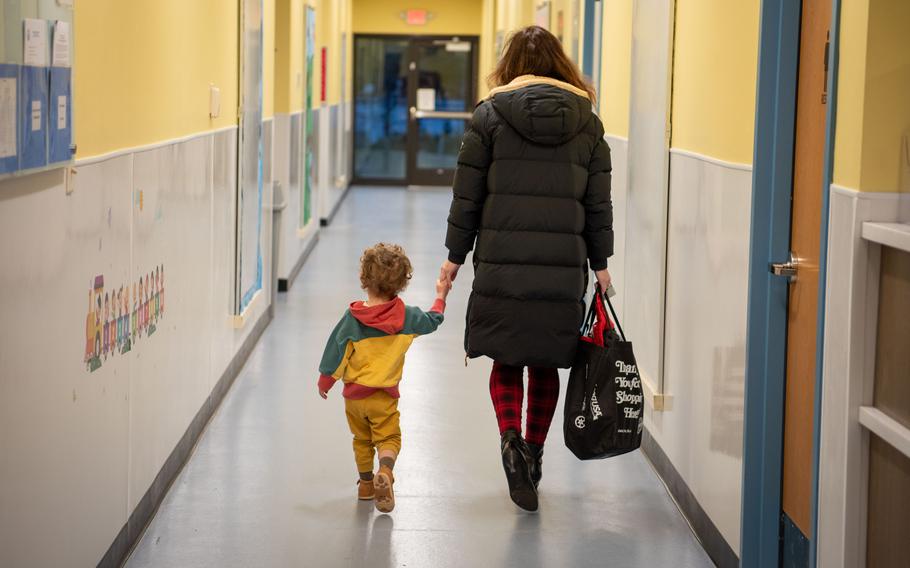
A parent escorts her son to his classroom at the Lakehurst Child Development Center on Joint Base McGuire-Dix-Lakehurst, N.J., March 18, 2024. (Jewaun Victor/U.S. Air Force)
WASHINGTON — A persistent deficit of affordable and available early child care for military families could be improved under a new bill that seeks to establish partnerships between the military and civilian child care providers.
The legislation proposes the creation of a five-year pilot program to begin in 2026 that would task the Defense Department with entering into 12 partnerships with private and public child care centers on or near military installations to expand the number of child care options for service members.
The bill also would allow the military to partner with the volunteer program AmeriCorps to place volunteers in eligible child care centers as the nation struggles with child care worker shortages and military families grapple with additional obstacles.
“Right now, too many military families ... face unique challenges in accessing high-quality, affordable child care due to frequent moves and new school enrollments for their children,” said Sen. Jeanne Shaheen, D-N.H., the bill’s co-sponsor.
The pilot program proposal, which is also co-sponsored by Republican Sen. Joni Ernst of Iowa, would “leverage resources from the Department of Defense to train child care providers, increase available child care slots in communities across the country and provide new career development opportunities,” Shaheen said.
Each of the services would be obligated to enter into at least one partnership, according to the bill.
The legislation is the latest attempt by lawmakers to address an issue that senior military leaders contend is a primary concern for recruitment and retainment.
Master Chief Petty Officer of the Navy James Honea told the House Appropriations Committee last month that the ability to secure and afford adequate child care is “one of the top stressors” for sailors and their families. It also inhibits employment opportunities for military spouses, he said.
One-third of active-duty spouses said they cannot find child care that works for their employment needs, according to a 2023 survey by Blue Star Families, a nonprofit founded by military spouses.
The bill proposed by Shaheen and Ernst would encourage the Defense Department to recruit and offer training and certification to military spouses who are interested in becoming child care providers.
The lack of an eligible and willing workforce is particularly acute in places where military bases are competing for workers with child care providers operating in local communities, Honea said.
“Many of our child development centers are … unable to reach full capacity due to those staff shortages,” he said.
Some families have been able to find relief through a fee assistance pilot program that helps cover costs for in-home child care such as nannies. Expanding the limited-capacity program, called Child Care in Your Home, to more families and locations would make “an immediate impact,” Honea said.
“We are finding great success with fee assistance pilots,” he said.
For now, the pilot program is available in regions with the highest demand and longest waitlists for child care, including the Washington, D.C., area and parts of California, Colorado, Florida, Hawaii, Nevada, North Carolina, Texas and Washington.
The nontraditional schedules of military families present a unique challenge for securing dependable child care, Chief Master Sgt. John Bentivegna of the Space Force said during testimony to lawmakers last month.
“Child care access challenges are compounded by the complexity of shift work, where guardians can struggle to find child care outside of normal business hours and on weekends,” he said.
Congress this year allocated $336 million for child care centers, including the construction of six new facilities. But building projects alone cannot solve the shortage of people willing to work in child care, Honea said.
“It is critical that we continue to look at all available options to tackle these shortfalls,” he said.